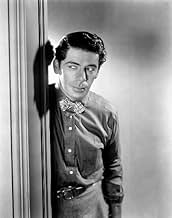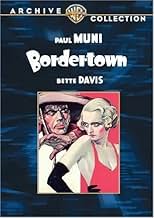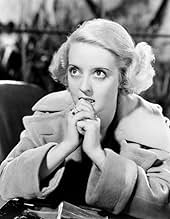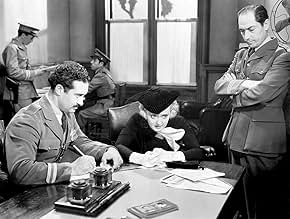IMDb-BEWERTUNG
6,6/10
2071
IHRE BEWERTUNG
Füge eine Handlung in deiner Sprache hinzuIn Mexico, a former lawyer becomes the invaluable second-in-command to a casino owner, whose wife begins to fall for him.In Mexico, a former lawyer becomes the invaluable second-in-command to a casino owner, whose wife begins to fall for him.In Mexico, a former lawyer becomes the invaluable second-in-command to a casino owner, whose wife begins to fall for him.
Soledad Jiménez
- Mrs. Ramirez
- (as Soledad Jimenez)
William B. Davidson
- Dr. Carter
- (as William Davidson)
Oscar Apfel
- Judge Rufus Barnswell
- (Nicht genannt)
Wade Boteler
- Man Wanting to Buy Roark's Casino
- (Nicht genannt)
Glen Cavender
- Man Restraining Johnny in Courtroom Fight
- (Nicht genannt)
Jack Chefe
- Waiter
- (Nicht genannt)
Wallis Clark
- Friend of Dean on Podium
- (Nicht genannt)
Carlos De Valdez
- Magistrado
- (Nicht genannt)
Empfohlene Bewertungen
Confronting Muni in one scene, Davis suddenly so forcefully expels cigarette smoke from her nose that she looks like a cartoon bull about to charge. But though it's funny, it's not ludicrous: it's one of those startling, inspired B.D. moments.
Warners cast Davis in "Bordertown" when it became apparent that her just-completed loanout to RKO for "Of Human Bondage" was not going to wreck her career, as Warners had feared. Instead, as Davis had gambled, the risky "Bondage" had been her breakout performance. "Bordertown" was a worthy follow-up, with Davis just as compelling as the obsessor rather than the obsessee.
Warners cast Davis in "Bordertown" when it became apparent that her just-completed loanout to RKO for "Of Human Bondage" was not going to wreck her career, as Warners had feared. Instead, as Davis had gambled, the risky "Bondage" had been her breakout performance. "Bordertown" was a worthy follow-up, with Davis just as compelling as the obsessor rather than the obsessee.
As a poor Mexican-American boy, Muni labors to get a night-school law degree, but can't make a professional living in such a poor neighborhood. Ambitious and tough, he works his way into heading a gambling casino. Though a financial success, he loses his way in a white- dominated social world.
It's 1934 and the notorious Hollywood Production Code has just kicked in. Few studios were more affected than Warner Bros., the home of the uncompromising gangster films of Cagney, Robinson, and Muni. There are elements of the typical rags-to-riches gangster theme in this movie, but the tone and content have altered from the pre-Code product. Note the complete absence of gunplay, dead bodies, brutality, and other staples of such pre-Code classics as Public Enemy (1931), Little Caesar (1931), and Scarface (1932).
Technically, this is not a gangster movie-- Muni may be shady, yet he's no criminal. But that too, I believe, results from trying to get right with the new Code. Note how business rivals try to buy out Palette's casino instead of just muscling-in in classic gangster fashion. And though the girls sport some pretty revealing gowns, Muni refuses Davis's overtures, while remaining unclear on his relationship with Lindsey. Such compromises likely result from the producers not wanting sexual relationships to cross racial lines. Contrast this with the strong hints of incest, no less, in the free-wheeling Scarface.
In short, the movie has the trappings of a gangster film, yet departs in ways that I think are traceable to the newly installed Code. Among others, the new strictures were supposed to end public enthrallment with the underworld by deglamorizing it. Thus, Bordertown lacks many of the risky elements that made Warner Bros. such a riveting and dynamic studio during its classical period.
Now, this is not to say the movie is without interest or entertainment value. It took some guts to make Muni's central character a Mexican-American and cast him in a sympathetic light. In fact, the only thoroughly dislikable character is Lindsey's snobbish white boyfriend (Manville). At the same time, I agree with others who think Muni's performance is too florid, along with an accent that sort of comes and goes. He looks the part, but never gets past the impersonation stage. On the other hand, Davis's one scene of nervous frustration while alone in a room is a little gem of mounting hysteria, and makes me appreciate how well she emoted with her expressive eyes. However, it's Margaret Lindsay who walks off with the movie, at least in my view. Her devious upper-class lady is compellingly natural and unaffected, an interesting contrast to Muni's undiluted staginess.
Anyway, the movie may be a come-down from Warner's pre-Code product, but still includes a couple of good twists (e.g. the first courtroom scene). It's also worth a look-see for anyone interested in the evolution of the gangster movie.
It's 1934 and the notorious Hollywood Production Code has just kicked in. Few studios were more affected than Warner Bros., the home of the uncompromising gangster films of Cagney, Robinson, and Muni. There are elements of the typical rags-to-riches gangster theme in this movie, but the tone and content have altered from the pre-Code product. Note the complete absence of gunplay, dead bodies, brutality, and other staples of such pre-Code classics as Public Enemy (1931), Little Caesar (1931), and Scarface (1932).
Technically, this is not a gangster movie-- Muni may be shady, yet he's no criminal. But that too, I believe, results from trying to get right with the new Code. Note how business rivals try to buy out Palette's casino instead of just muscling-in in classic gangster fashion. And though the girls sport some pretty revealing gowns, Muni refuses Davis's overtures, while remaining unclear on his relationship with Lindsey. Such compromises likely result from the producers not wanting sexual relationships to cross racial lines. Contrast this with the strong hints of incest, no less, in the free-wheeling Scarface.
In short, the movie has the trappings of a gangster film, yet departs in ways that I think are traceable to the newly installed Code. Among others, the new strictures were supposed to end public enthrallment with the underworld by deglamorizing it. Thus, Bordertown lacks many of the risky elements that made Warner Bros. such a riveting and dynamic studio during its classical period.
Now, this is not to say the movie is without interest or entertainment value. It took some guts to make Muni's central character a Mexican-American and cast him in a sympathetic light. In fact, the only thoroughly dislikable character is Lindsey's snobbish white boyfriend (Manville). At the same time, I agree with others who think Muni's performance is too florid, along with an accent that sort of comes and goes. He looks the part, but never gets past the impersonation stage. On the other hand, Davis's one scene of nervous frustration while alone in a room is a little gem of mounting hysteria, and makes me appreciate how well she emoted with her expressive eyes. However, it's Margaret Lindsay who walks off with the movie, at least in my view. Her devious upper-class lady is compellingly natural and unaffected, an interesting contrast to Muni's undiluted staginess.
Anyway, the movie may be a come-down from Warner's pre-Code product, but still includes a couple of good twists (e.g. the first courtroom scene). It's also worth a look-see for anyone interested in the evolution of the gangster movie.
"Bordertown" features a far more convincing performance from Paul Muni, who manages to curtail his usual theatrical approach to film acting. Bette Davis is an excellent female lead for Muni and their scenes radiate with tension. Maragret Lindsay is OK in the supporting cast but she isn't in Davis's league. Paul Muni plays a newly qualified lawyer who decides to make a career for himself near the Mexican border after some problems earlier on in the film. He is employed by a wealthy businessman (Eugene Pallete) to handle all the legal wranglings for his building firm. However, trouble soon rears its head in the form of the businessman's wife, Bette Davis. The second half of "Bordertown" was remade by "Warner Bros" for the 1940 film, "They Drive By Night." It is a coin toss as to who is more fiery and feisty out of Bette Davis and Ida Lupino in the same role. For me, it is an even draw. The plot and the narrative are both strong and with some good dialogue. This is one of the best films Paul Muni whilst at "Warner Bros."
"Bordertown" is the story of a Mexican attorney, Johnny Ramirez, and his fight to make something of himself and realize the American dream. Who better to portray him than the Jewish Paul Muni.
After physically attacking another attorney during a disastrous court appearance, Johnny becomes a bouncer in a nightclub. However, his brains, ability, and negotiation expertise come to the attention of his boss, Roark (Eugene Palette), who agrees to bring him in as a partner.
Johnny has also come to the attention of Marie Roark (Bette Davis), the restless wife of the boss, and she throws herself at him. Johnny, however, has fallen for Dale (Margaret Lindsay), a socialite. Marie kills her husband, and when he rejects her again, she tells the police that Johnny killed Roark.
Paul Muni was an excellent actor whose style of acting is perhaps dated by today's standards. He could disappear into his roles, often to great effect, but unfortunately, he doesn't disappear enough into Johnny Ramirez. His portrayal is over the top and his accent is bad.
The standout is Bette Davis, young and pretty, as the unstable wife. Just off her great success in "Of Human Bondage," which was a loanout by Warners, she demonstrates here how well she takes charge of the screen.
Most of the characters are pretty stereotypical. "Bordertown" is badly dated but worth seeing for its early Bette Davis performance.
After physically attacking another attorney during a disastrous court appearance, Johnny becomes a bouncer in a nightclub. However, his brains, ability, and negotiation expertise come to the attention of his boss, Roark (Eugene Palette), who agrees to bring him in as a partner.
Johnny has also come to the attention of Marie Roark (Bette Davis), the restless wife of the boss, and she throws herself at him. Johnny, however, has fallen for Dale (Margaret Lindsay), a socialite. Marie kills her husband, and when he rejects her again, she tells the police that Johnny killed Roark.
Paul Muni was an excellent actor whose style of acting is perhaps dated by today's standards. He could disappear into his roles, often to great effect, but unfortunately, he doesn't disappear enough into Johnny Ramirez. His portrayal is over the top and his accent is bad.
The standout is Bette Davis, young and pretty, as the unstable wife. Just off her great success in "Of Human Bondage," which was a loanout by Warners, she demonstrates here how well she takes charge of the screen.
Most of the characters are pretty stereotypical. "Bordertown" is badly dated but worth seeing for its early Bette Davis performance.
Although Paul Muni does go over the top a bit in Bordertown, the film remains a savage indictment of racism, concentrating as it does on the struggles of one man in a racial/ethnic minority to find a place in this society.
In a biography of Paul Muni I read that he deliberately hired a Mexican driver who stayed with him for several weeks so he could copy his mannerisms and get down the proper speech pattern. He didn't do half bad as Johnny Ramirez, the disbarred attorney who turns to the dark side.
The story has Muni bright and eager to start making a living as a lawyer and please his mom Soledad Jimenez who sacrificed a lot so her kid could study law. But in his first appearance in court he loses his temper and manages to get himself disbarred.
Had this been a white attorney, I assure you he might have gotten a slap on the wrist and a censure, but not a disbarment. Broken in spirit, Muni ends up working for Eugene Palette at a road house as a bouncer.
He also catches the eye of Palette's wife played by Bette Davis. But Muni has eyes for Margaret Lindsay, a society girl who likes to go slumming. In the end both women disillusion and betray him.
Bordertown is one of the darkest films of the Thirties, the future is by no means clear for Muni. Though he does overact a bit, you will not forget the smoldering anger that he brings to the part of Johnny Ramirez. This was the second of two films in which Paul Muni played a person of Mexican background. The other was Juarez and there is 180 degree difference between the angry Ramirez and the stoic Juarez. You can hardly believe it's the same actor, but Muni had one incredible range as a player.
This is a film that could probably stand a remake. I could see someone like Benjamin Bratt or Lou Diamond Phillips in an updated version as Johnny Ramirez, possibly Edward James Olmos. It was in fact made over in part by Warner Brothers in They Drive By Night. But the Mexican heritage and a great deal more was not included in that film.
Until then I recommend Bordertown highly
In a biography of Paul Muni I read that he deliberately hired a Mexican driver who stayed with him for several weeks so he could copy his mannerisms and get down the proper speech pattern. He didn't do half bad as Johnny Ramirez, the disbarred attorney who turns to the dark side.
The story has Muni bright and eager to start making a living as a lawyer and please his mom Soledad Jimenez who sacrificed a lot so her kid could study law. But in his first appearance in court he loses his temper and manages to get himself disbarred.
Had this been a white attorney, I assure you he might have gotten a slap on the wrist and a censure, but not a disbarment. Broken in spirit, Muni ends up working for Eugene Palette at a road house as a bouncer.
He also catches the eye of Palette's wife played by Bette Davis. But Muni has eyes for Margaret Lindsay, a society girl who likes to go slumming. In the end both women disillusion and betray him.
Bordertown is one of the darkest films of the Thirties, the future is by no means clear for Muni. Though he does overact a bit, you will not forget the smoldering anger that he brings to the part of Johnny Ramirez. This was the second of two films in which Paul Muni played a person of Mexican background. The other was Juarez and there is 180 degree difference between the angry Ramirez and the stoic Juarez. You can hardly believe it's the same actor, but Muni had one incredible range as a player.
This is a film that could probably stand a remake. I could see someone like Benjamin Bratt or Lou Diamond Phillips in an updated version as Johnny Ramirez, possibly Edward James Olmos. It was in fact made over in part by Warner Brothers in They Drive By Night. But the Mexican heritage and a great deal more was not included in that film.
Until then I recommend Bordertown highly
Wusstest du schon
- WissenswertesAt first, Paul Muni wanted Carole Lombard or Lupe Velez as female co-star, but after her success in Human Bondage (1934) he chose Bette Davis.
- PatzerWhen Johnny Ramirez shortly after losing the case leaves his home and starts hitchhiking, you see a montage of calendar months indicating the passage of time. But the dates of the month do not correspond with the year 1934, which was the year of the trial as indicated by the court papers filed. Also, the sequence of calendar dates shown in the montage is out of order. They begin with August of 1936 and end with July 1936 as opposed to July 1937.
- Zitate
Marie Roark: The only fun I get is feeding the goldfish, and they only eat once a day.
- VerbindungenFeatured in Code of the Secret Service (1939)
- SoundtracksMaria Elena
(1933) (uncredited)
Music by Lorenzo Barcelata
Played at the beginning and often in the score
Top-Auswahl
Melde dich zum Bewerten an und greife auf die Watchlist für personalisierte Empfehlungen zu.
- How long is Bordertown?Powered by Alexa
Details
- Erscheinungsdatum
- Herkunftsland
- Sprachen
- Auch bekannt als
- Bordertown
- Drehorte
- Los Angeles, Kalifornien, USA(Olvera Street in opening scene)
- Produktionsfirmen
- Weitere beteiligte Unternehmen bei IMDbPro anzeigen
- Laufzeit1 Stunde 25 Minuten
- Farbe
- Sound-Mix
- Seitenverhältnis
- 1.37 : 1
Zu dieser Seite beitragen
Bearbeitung vorschlagen oder fehlenden Inhalt hinzufügen

Oberste Lücke
By what name was Stadt an der Grenze (1935) officially released in India in English?
Antwort


































